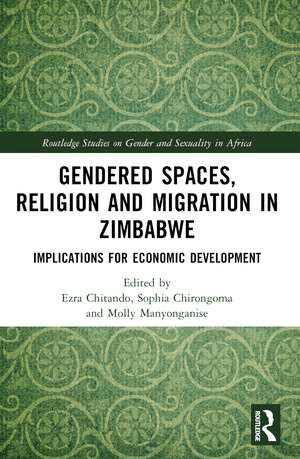Gendered Spaces, Religion and Migration in Zimbabwe: Implications for Economic Development: Routledge Studies on Gender and Sexuality in Africa
Editat de Ezra Chitando, Sophia Chirongoma, Molly Manyonganiseen Limba Engleză Paperback – 26 aug 2024
| Toate formatele și edițiile | Preț | Express |
|---|---|---|
| Paperback (1) | 391.57 lei 6-8 săpt. | |
| Taylor & Francis – 26 aug 2024 | 391.57 lei 6-8 săpt. | |
| Hardback (1) | 898.45 lei 6-8 săpt. | |
| Taylor & Francis – 12 oct 2022 | 898.45 lei 6-8 săpt. |
Preț: 391.57 lei
Nou
Puncte Express: 587
Preț estimativ în valută:
74.92€ • 78.24$ • 61.87£
74.92€ • 78.24$ • 61.87£
Carte tipărită la comandă
Livrare economică 15-29 aprilie
Preluare comenzi: 021 569.72.76
Specificații
ISBN-13: 9781032329833
ISBN-10: 1032329831
Pagini: 270
Ilustrații: 10
Dimensiuni: 156 x 234 mm
Greutate: 0.5 kg
Ediția:1
Editura: Taylor & Francis
Colecția Routledge
Seria Routledge Studies on Gender and Sexuality in Africa
Locul publicării:Oxford, United Kingdom
ISBN-10: 1032329831
Pagini: 270
Ilustrații: 10
Dimensiuni: 156 x 234 mm
Greutate: 0.5 kg
Ediția:1
Editura: Taylor & Francis
Colecția Routledge
Seria Routledge Studies on Gender and Sexuality in Africa
Locul publicării:Oxford, United Kingdom
Public țintă
Academic, Postgraduate, and Undergraduate AdvancedCuprins
1. Introduction: Gendered Spaces, Religion and Migration: Reflections from Zimbabwe-Ezra Chitando, Sophia Chirongoma and Molly Manyonganise Section A: The Power of Naming: Gendered Nuances 2. Gendered nuances and naming traditions in Zimbabwe: A Case study of the Shona Indigenous Religion- Viriri Maradze and Tenson Muyambo 3. Zimbabwean Women Where Art Thou? Harare Central Business District Anthroponymies, Culture, and Exclusion- Patricia R. Mabugu, Annastacia Dhumukwa and Cathrine R. Sibanda 4. Zimbabwean Women’s Writings and Women’s Theology: Supporting Women’s Struggles for Full Rights and Dignity- Anna Chitando and Ezra Chitando Section B: Religio- Cultural Traditions and Gender Based Discourses Shaping the Status of Zimbabwean Women 5. Religio-Cultural Traditions hindering Zimbabwean Women from accessing the benefits of the Fast Track Land Reform Programme (FTLRP)- Sibiziwe Shumba and Susan S. Dube 6. The Church’s Struggle for Gender Justice in Zimbabwe: Inspiration from Exodus 2:16-22- Xolani Maseko 7. Reflecting on Women’s Voices in the Anti-Gender Based Violence Discourse in Zimbabwean Music- Sindiso Zhou, Nomatter Sande & Nhlanhla Landa 8. Music as an oasis of hope and affirmation for African women of faith: An analysis of selected post-2000 Zimbabwean gospel lyrics- Sarah Yeukai Matanga 9. A Hermeneutical exploration of gender perceptions inherent some selected ChiShona poetry texts prescribed for Ordinary Level secondary school learners in Zimbabwe- Taringa Beatrice 10. Zimbabwean women’s portrayal and participation on social media: Vestiges of Religion and Culture?- Chipo Chirimuuta Section C: Interrogating the Challenges encountered by Zimbabwean Female Migrants 11. The Triple Suffering of Zimbabwean Women Trafficked to the Middle East: Examining Women’s Religio-Cultural, Socioeconomic and Emotional Trauma- Martin Mujinga 12. Zimbabwe at forty, usukhulile/wakura: Interrogating the ihlazo and Religio-Cultural violations endured by Zimbabwean female "illegal" migrants in South Africa- Herbert Moyo 13. Ethical dilemma for Zimbabwean Christian Women Engaged in Cross-Border Trading- Tabitha Bishau 14. Labour laws and the deskilling of professional migrant women from Zimbabwe to South Africa- Angela Gubba and Sinenhlanhla Sithulisiwe Chisale 15. Unmasking patriarchy: The plight of Zimbabwean migrant ‘career-wives’ in light of the South African immigration regulations- Sinenhlanhla S. Chisale, Nellie D. Myburgh and Angela Gubba
Notă biografică
Ezra Chitando serves as Professor of Religious Studies at the University of Zimbabwe and Theology Consultant on HIV for the World Council of Churches. He is also extraordinary professor at the University of the Western Cape.
Sophia Chirongoma is a senior lecturer in the Religious Studies Department at Midlands State University, Zimbabwe. She is also an Academic Associate/Research Fellow at the Research Institute for Theology and Religion (RITR) in the College of Human Sciences, University of South Africa (UNISA). Her research interests and publications focus on the interface between culture, ecology, religion, health and gender justice.
Molly Manyonganise holds a PhD in Biblical and Religious Studies from the University of Pretoria. She is a senior lecturer in the Department of Religious Studies and Philosophy at the Zimbabwe Open University. She is a Research Associate in the Department of Religion Studies, Faculty of Theology and Religion of the University of Pretoria. Currently, she is a Georg Forster Postdoctoral research fellow, Alexander von Humboldt Foundation. Her research interests comprise religion and politics, gender and religion, religion and sexuality, African Indigenous Religion(s) as well as African Christianity.
Sophia Chirongoma is a senior lecturer in the Religious Studies Department at Midlands State University, Zimbabwe. She is also an Academic Associate/Research Fellow at the Research Institute for Theology and Religion (RITR) in the College of Human Sciences, University of South Africa (UNISA). Her research interests and publications focus on the interface between culture, ecology, religion, health and gender justice.
Molly Manyonganise holds a PhD in Biblical and Religious Studies from the University of Pretoria. She is a senior lecturer in the Department of Religious Studies and Philosophy at the Zimbabwe Open University. She is a Research Associate in the Department of Religion Studies, Faculty of Theology and Religion of the University of Pretoria. Currently, she is a Georg Forster Postdoctoral research fellow, Alexander von Humboldt Foundation. Her research interests comprise religion and politics, gender and religion, religion and sexuality, African Indigenous Religion(s) as well as African Christianity.
Descriere
This book explores the intersections of gender, religion and migration within the context of post-independent Zimbabwe, with a specific focus on how gender disparities impact economic development. It addresses the need for gender equity, gender inclusion and gender mainstreaming in both religious and societal institutions.














